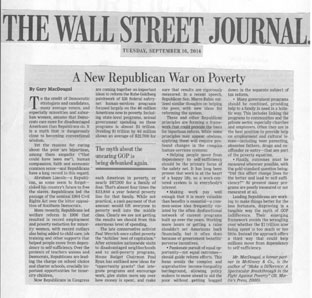The Wall Street Journal
9/15/2014
Gary MacDougal
 To the credit of Democratic strategists and candidates, many average voters, and especially minorities and suburban women, assume that Democrats care more for disadvantaged Americans than Republicans do. It is a myth that is dangerously close to becoming conventional wisdom.
To the credit of Democratic strategists and candidates, many average voters, and especially minorities and suburban women, assume that Democrats care more for disadvantaged Americans than Republicans do. It is a myth that is dangerously close to becoming conventional wisdom.
Yet the reasons for caring about the poor are bipartisan, among them empathy ("that could have been me"), human compassion, faith and economic common sense—and Republicans have a long record in this regard.
Abraham Lincoln —a Republican, as some seem to forget—risked his country's future to free the slaves. Republicans led the passage of the seminal 1964 Civil Rights Act over the bitter opposition of Southern Democrats.
More recently, Republicans led welfare reform in 1996 that resulted in record employment and poverty reduction for minority women, with record outlays also being added to child care, job training and other supports that helped people move from dependency to self-sufficiency. Over the protests of teachers unions and Democrats, Republicans are leading the charge on school choice and charter schools, crucially important opportunities for inner-city children,
Now Republicans in Congress are coming together on important ideas to reform the Rube Goldberg patchwork of 126 federal safety-net human-services programs focused largely on the 46 million Americans now in poverty. Including state-level programs, annual government spending on these programs is almost $1 trillion. Dividing $1 trillion by 46 million shows an average of $21,700 for each American in poverty, or nearly $87,000 for a family of four. That's almost four times the $23,850 a year federal poverty line for that family. While not practical, a cash payment of that amount would lift everyone in poverty well into the middle class. Clearly we are not getting the results we should from this enormous level of spending.
The late conservative activist Paul Weyrich once called poverty the "Achilles' heel of capitalism." After extensive nationwide visits to disadvantaged neighborhoods and to anti-poverty programs, House Budget Chairman Paul Ryan has outlined new ideas for "opportunity grants" that integrate programs and encourage work, give states more say over how money is spent, and make sure that results are rigorously measured. In a recent speech, Republican Sen. Marco Rubio outlined similar thoughts on helping the poor, with new ideas for reforming the system.
These and other Republican principles are forming a framework that could provide the basis for bipartisan reform. While some principles may appear obvious, applying them will require profound changes in the complex human-services systems:
- Helping people move from dependency to self-sufficiency should be the primary focus of the safety net. It has long been proven that work is at the heart of a happy life, so a work-centered system is in everybody's interest.
- Making work pay well enough that it is more valuable than benefits is essential—a common-sense idea frequently violated by the often dysfunctional network of current programs built up over the years. Working more hours or getting a raise shouldn't set Americans back financially, but it often does because of government benefits' perverse incentives.
- Passionate pursuit of equal opportunity—not equal outcomes—should guide reform efforts. This focus avoids the complex and unproductive income-inequality battleground, allowing policy makers to move ahead to aid the poor without getting bogged down in the separate subject of tax reform.
- Many government programs should be combined, providing help to a family in need in a holistic way. This includes linking the programs to communities and the private sector, especially churches and employers. Often they are in the best position to provide help on employment and cultural issues—including teen parenting, absentee fathers, drugs and ex-offender re-entry—that are part of the poverty equation.
Leading Republicans are working to make things better for the less fortunate, disproving in a tangible way the myth of GOP indifference. Their emerging framework avoids the wrangling over whether the $1 trillion now being spent is too much or too little. Instead the approach offers a third way that could help millions move from dependency to self-sufficiency.
Mr. MacDougal, a former partner in McKinsey & Co., is the author of "Make a Difference: A Spectacular Breakthrough in the Fight Against Poverty" (St. Martin's Press, 2000).